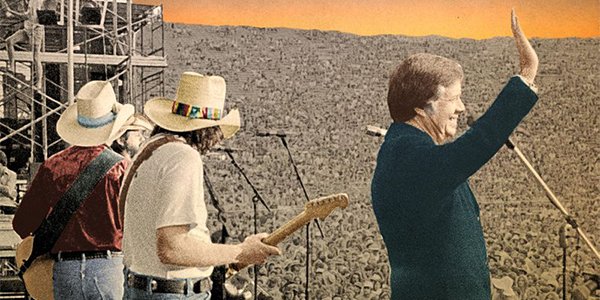For Jimmy Carter – the sweet-faced, soft-voiced peanut farmer – many images come to mind.
Few of them involve long-haired rockers with wailing guitars – until now.
“It was the Allman Brothers who put us in the White House,” Carter, 96, says in “Jimmy Carter: Rock & Roll President” (shown here), a fascinating documentary movie that airs Sunday (Jan. 3) on CNN. The Allmans, he says, “were raising money when I didn’t have any.”
And others joined in. Some (Charlie Daniels, for instance) were conservative, some weren’t, but all seemed to like Carter. More important, perhaps, he liked them … and liked music in general.
“When we had no money at all, Dad spent $600 on the stereo,” Chip Carter says in the film.
That interest started with the songs he heard in Georgia churches. “He wouldn’t pick up a hymnal,” says Andrew Young, the former Atlanta mayor. “He knew all the words.”
From there, he spread into other genres. Carter has talked fondly of jazz. In the film, we hear from the stars of folk (Bob Dylan), soul (Nile Rodgers), rock/pop (Bono, Paul Simon, Jimmy Buffett) and country (Willie Nelson, Larry Gatlin, Garth Brooks, Trisha Yearwood).
“The guy’s 40 years older than me,” Brooks says (exaggerating by two years) and he’s still able to run circles around me.” Only now – once COVID allows – will Brooks and Underwood take charge of the Habitat For Humanity homebuilding that Jimmy and Rosalynn Carter did for decades.
The Carters went to a screening of the film and approved, Chip said in a virtual forum. “They were crying when it was finishing.”
At the forum, Bishop Michael Curry – head of the Episcopal Church (and a speaker at the Harry-Meghan royal wedding) spoke highly of the man: “In Jimmy Carter, we see someone who represents the smiling face of God.”
Curry also sees a logic to the film’s emphasis. “Music has a way of getting … to the heart and soul.”
In Carter’s case, it did much more. He was a long-shot candidate, with little money for the presidential primaries. But the Allmans kept doing fundraising concerts. “He was real and he became a friend,” Gregg Allman says in the film.
Others joined in. When Dylan visited, he and Carter stepped aside for a long talk about lyrics.
In the White House, an aide says, music became a constant. When the Chinese ambassador arrived, his one request was to see Nashville. A big country-music night at the White House had an enthusiastic crowd … but Carter wasn’t there; he was cloistered for the 12-day Camp David talks that produced a historic agreement between Israel and Egypt.
Still, foreign issues torpedoed the Carter years. There was the Gulf War that led to a gas shortage … the Soviet invasion of Afghanistan, leading to the U.S. withdrawal from the Olympics in Moscow … and the ongoing Iran hostage crisis. In 1980, the re-election bid was soundly defeated by Ronald Reagan.
Much later, after decades as an international mediator, Carter would win the 2002 Nobel Peace Prize. In the film, he looks back at his presidency: “We never dropped a bomb, we never fired a missile, we never shot a bullet (at) another individual.” They were peaceful (and musical) years.
– “Jimmy Carter: Rock & Roll President”
– 9 p.m. ET Sunday (Jan. 3), repeating at midnight; also, 10 p.m. ET Saturday, Jan. 9
